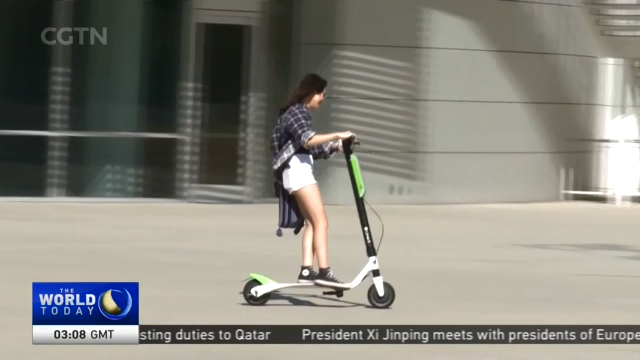
11:26, 17-Jul-2018
China-US Trade Frictions: Tariffs could put the brakes on booming electric scooter craze
Updated
11:24, 20-Jul-2018
02:55

If you haven't seen waves of electric kick-scooter riders on the streets - just hang on - it's highly likely they'll be coming to a city near you soon. The trend has taken off in the U.S., but trade frictions threaten to slap a 25 percent tariff on the Chinese-made imports. Mark Niu has the details.
Max Ibel rides his electric kick scooter to work because its quick and helps him avoid dealing with parking. He bought his Chinese-made Xiaomi scooter on Amazon. As a venture capitalist, he believes the potential 25 percent tariff on China-made scooters could be problematic.
MAX IBEL PARTNER OF AMINO CAPITAL "They are all made in China. It will just get expensive for those companies. Especially if you have a startup that's operating at the margin, it makes actually a big difference if things are 25% more expensive."
U.S. start-ups like Bird and Lime have adapted the ride-sharing business model to kick scooters, helping thousands of people to get from place to place for just a few dollars.
"As long as it's a fair price. I'm okay."
Once focused on bicycle sharing, Spin is now converting its entire fleet to scooters in more than 70 U.S. markets to electric kick scooters.
DERRICK KO CO-FOUNDER & CEO OF SPIN "Our revenue, usage on scooters is at least twenty times higher than bikes. That just shows an extremely strong product market fit. It's something that people want to use. When tariffs come into play, and if they do, it's just a bump on the road."
Electric kick scooters would likely fall under the tariff category listed as motorcycles, including mopeds and cycles, with electric motor for propulsion. Spin is currently using Ninebot scooters, which are made in China and owned by Xiaomi.
DERRICK KO CO-FOUNDER & CEO OF SPIN "We definitely don't expect ultimately to change the business model too much, we don't intend on passing the cost down to our riders. In parallel, we are looking at trying to explore other options, should the tariffs if and when they do hit us, try to reduce the impact of that by looking at U.S. manufacturing."
MARK NIU SAN FRANCISCO "With this new headquarters in San Francisco, another transport startup is eyeing the market. Shared electric scooter maker and electric bike maker Scoot is about to enter the kick scooter arena."
Founder Michael Keating doesn't think the tariffs will dramatically impact their bottom line.
MICHAEL KEATING FOUNDER & CEO OF SCOOT "One of the great strengths we've seen from China is producing a lot of great, small electric vehicles to solve a big problem, which is how do you get hundreds of millions of people to move around cities, and that's something we can learn from in the U.S. and we can take advantage of that and when we erect barriers to that kind of collaboration and sharing. That just slows things down a little but it doesn't actually stop the progress."
As scooter sharing has yet to become big in China, U.S. start-ups have a chance to lead the market, though a trade war could make that more challenging and expensive. Mark Niu, CGTN, San Francisco.

SITEMAP
Copyright © 2018 CGTN. Beijing ICP prepared NO.16065310-3
Copyright © 2018 CGTN. Beijing ICP prepared NO.16065310-3